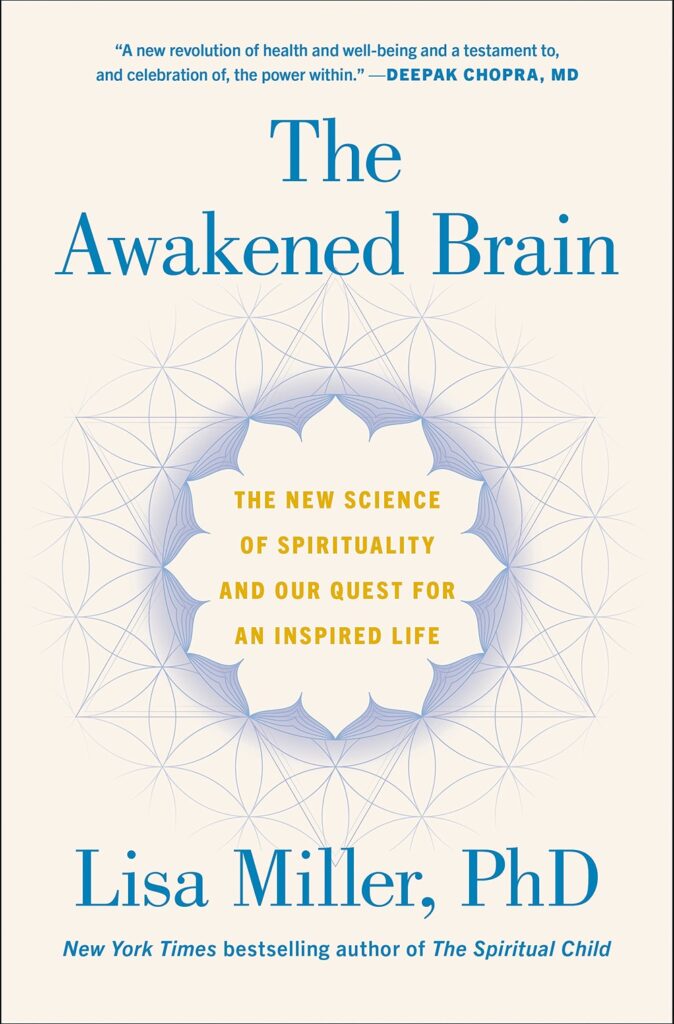Sharing my learnings from the book, The Awakened Brain by Lisa Miller
The Awakened Brain by Lisa Miller
Whether it’s meditation or a walk in nature, reading a sacred text or saying a prayer, there are many ways to tap into a heightened awareness of the world around you and your place in it. In The Awakened Brain, psychologist Dr. Lisa Miller shows you how.
Weaving her own deeply personal journey of awakening with her groundbreaking research, Dr. Miller’s book reveals that humans are universally equipped with a capacity for spirituality, and that our brains become more resilient and robust as a result of it. For leaders in business and government, truth-seekers, parents, healers, educators, and any person confronting life’s biggest questions, The Awakened Brain combines cutting-edge science (from MRI studies to genetic research, epidemiology, and more) with on-the-ground application for people of all ages and from all walks of life, illuminating the surprising science of spirituality and how to engage it in our lives

- how poverty and having a mother with depression increase a child’s risk of depression, while affectionate parenting styles protect against it.
- When both a mother and her child had high spirituality, the child was 80 percent protected against depression. intergenerational transfer of spirituality was by far the strongest protective factor against depression
- Discovery from Dr. Kenneth Kendler’s study at the Virginia Commonwealth University, which investigated the relationship between spirituality and mental health in adults.
- a person could be spiritual but not religious, or vice versa. Spirituality emphasizes a sense of a personal relationship with a higher power, whereas religion involves strict adherence to religious rules and practices.
- the presence of spirituality was found to protect against depression, alcoholism, and negative stressful events, regardless of whether religious devotion was also present.
- the degree to which a person is spiritual is 29 percent determined by their genes, and 71 percent by their environment.
- whether you’re raised in a faith tradition or not, spirituality has a genetic basis, and part of our development as humans is to find our own personal spiritual beliefs.
- depression is associated with a distorted view of our relationship to the world – a failure to see the bigger picture.
- a spiritual brain is thicker and more robust in the same regions that are thinner and weaker in a depressed brain. Spiritual people have a thicker cortex.
- people more prone to depression were also more sensitive to the benefits of spirituality.
- spirituality is catalyzed in moments of struggle and suffering.
- we’re primed for spiritual development at different stages in life, that responding to struggles with spiritual awareness in one phase can help us in the next, and that failing to do so increases the likelihood of depression.
- humanity is hard-wired for spirituality and that a spiritual brain is a healthier brain.
- two types of attention in research
- Top-down attention is when we already have an idea and then scan the environment for information that suits our goal. It has the benefit of keeping us focused but also limits our perception. With top-down attention, you tend to ignore everything else.
- bottom-up attention, is more open and less selective. It allows you to see things that you may not have been looking for.
- we are seekers rather than makers of our path.
- when we live with spiritual awareness, we walk through life differently, and see meaning where we otherwise wouldn’t.
- Spirituality activates the brain’s ventral attention network, the bottom-up awareness that allows us to see beyond our conscious control. Our brains are wired to perceive a larger consciousness.
- Healing happens not by simply reliving trauma and getting stuck in a cycle of rumination, but by aligning with a larger meaning that life reveals to us.
- make more space for inner listening by using meditative practices, noticing the synchronicities in your life, or spending time in nature, whatever you choose, you need to cultivate your spiritual capacity.
- Spiritual experiences deactivate your achieving mind and activate your awakened mind.
- Stress activates the achieving mind: a mode of awareness that focuses on organizing and controlling our lives.
- spiritual experiences activates different part of the brain: the frontotemporal network, which is associated with love; the parietal lobe, where we experience feelings of unity and belonging; and the ventral attention network, where we see the world as active and speaking to us.
- Rather than being limited, tense, and controlling like the achieving mind, the awakened mind uses different parts of the brain that make us more open to information from different sources. It allows us to see the meaning and relationship between events, while also feeling more connected and less alone.
- Divine love and human love are connected. The awakened brain is one that can see its connection to all life and its source.


Leave a Reply